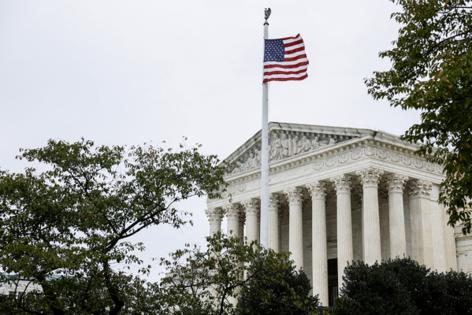Supreme Court sharply limits environmental impact statements in victory for developers
Published in Political News
WASHINGTON — The Supreme Court on Thursday sharply limited the reach of environmental impact statements in a victory for developers.
The justices said these claims of the potential impact on the environment have been used too often to delay or block new projects.
“A 1970 legislative acorn has grown over the years into a judicial oak that has hindered infrastructure development under the guise of just a little more process. A course correction of sorts is appropriate,” said Justice Brett M. Kavanaugh, speaking for the court.
He said procedural law has given judges and environmentalists too much authority to hinder or prevent development, he said.
“Fewer projects make it to the finish line. Indeed, fewer projects make it to the starting line. Those that survive often end up costing much more than is anticipated or necessary,” he said. “And that in turn means fewer and more expensive railroads, airports, wind turbines, transmission lines, dams, housing developments, highways, bridges, subways, stadiums, arenas, data centers, and the like. And that also means fewer jobs, as new projects become difficult to finance and build in a timely fashion.”
The decision could loom large in California and the West because the 9th Circuit Court of Appeals has taken a broad view of environmental protection and the scope of impact statements.
The National Environmental Policy Act of 1970s was the first of a series of landmark environmental laws. It required federal agencies to prepare a report assessing the likely impact of projects that will be funded or approved by the government.
“The goal of the law is to inform agency decision-making, not to paralyze it,” Kavanaugh said.
In a unanimous decision, the high court ruled for the developers of a proposed 88-mile railroad in northeastern Utah, a spur line which could carry crude oil that would be refined along the Gulf Coast.
The project needed the approval of the U.S. Surface Transportation Board which produced 3,600 pages of analysis on the potential impact.
In blocking the proposal, the D.C. Circuit Court of Appeals cited its potential to spur more drilling for oil in Utah and more pollution along the Gulf Coast. The judges said these “upstream” and “downstream” impacts of the railroad must be considered before the new rail line is approved.
Seven counties that favored the development appealed to the Supreme Court and argued that the potential environment impact should be limited to the building of the railroad itself.
Kavanaugh and the court agreed. “The board did not need to evaluate potential environmental impacts of the separate upstream and downstream projects,” he said.
The court’s three liberals — Justices Sonia Sotomayor, Elena Kagan and Ketanji Brown Jackson — concurred in the decision but did not sign on to Kavanaugh’s opinion.
Justice Neil M. Gorsuch, a Colorado native who is friends with some of the leading developers, did not participate in the decision.
©2025 Los Angeles Times. Visit at latimes.com. Distributed by Tribune Content Agency, LLC.

























































Comments